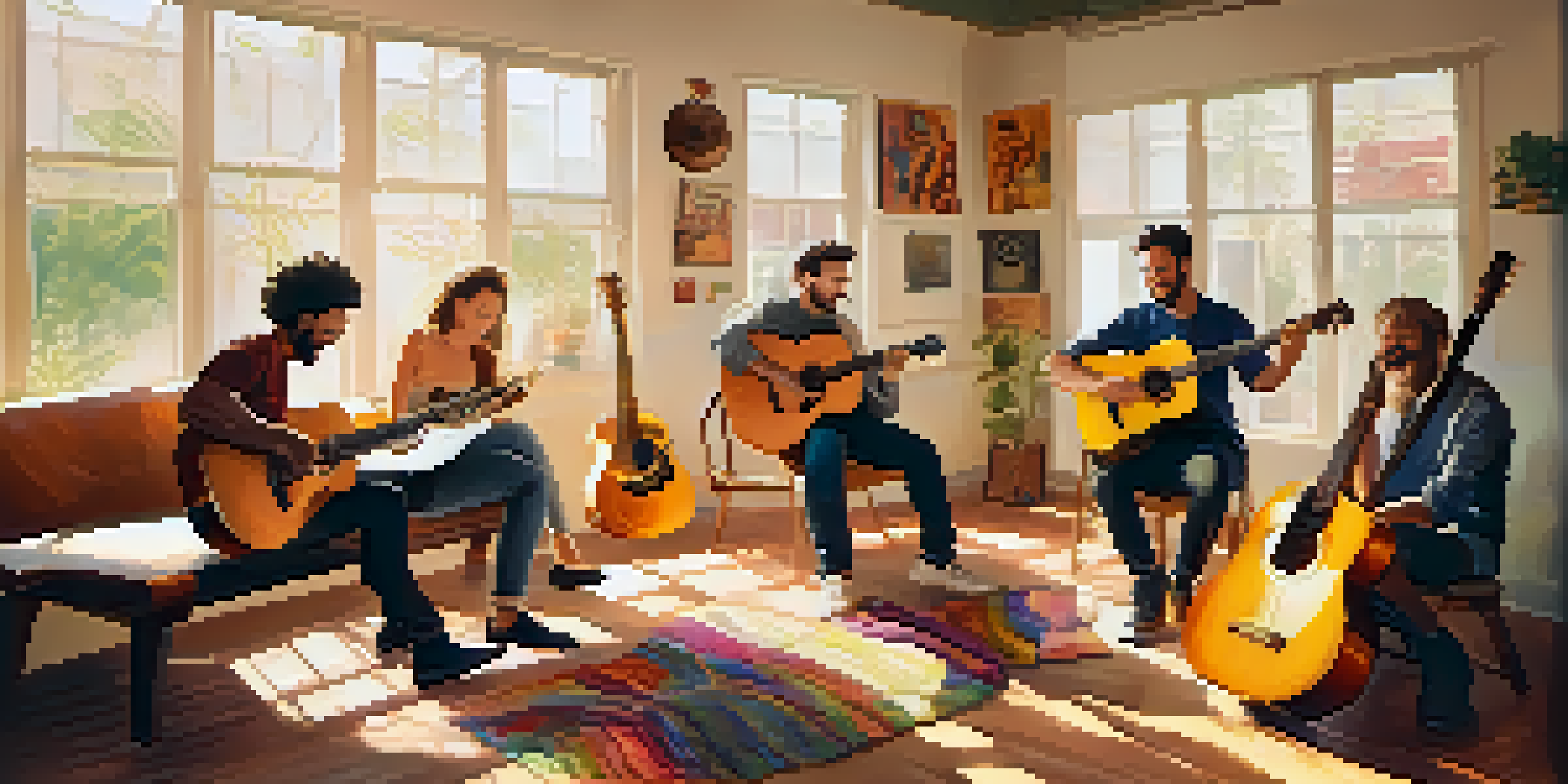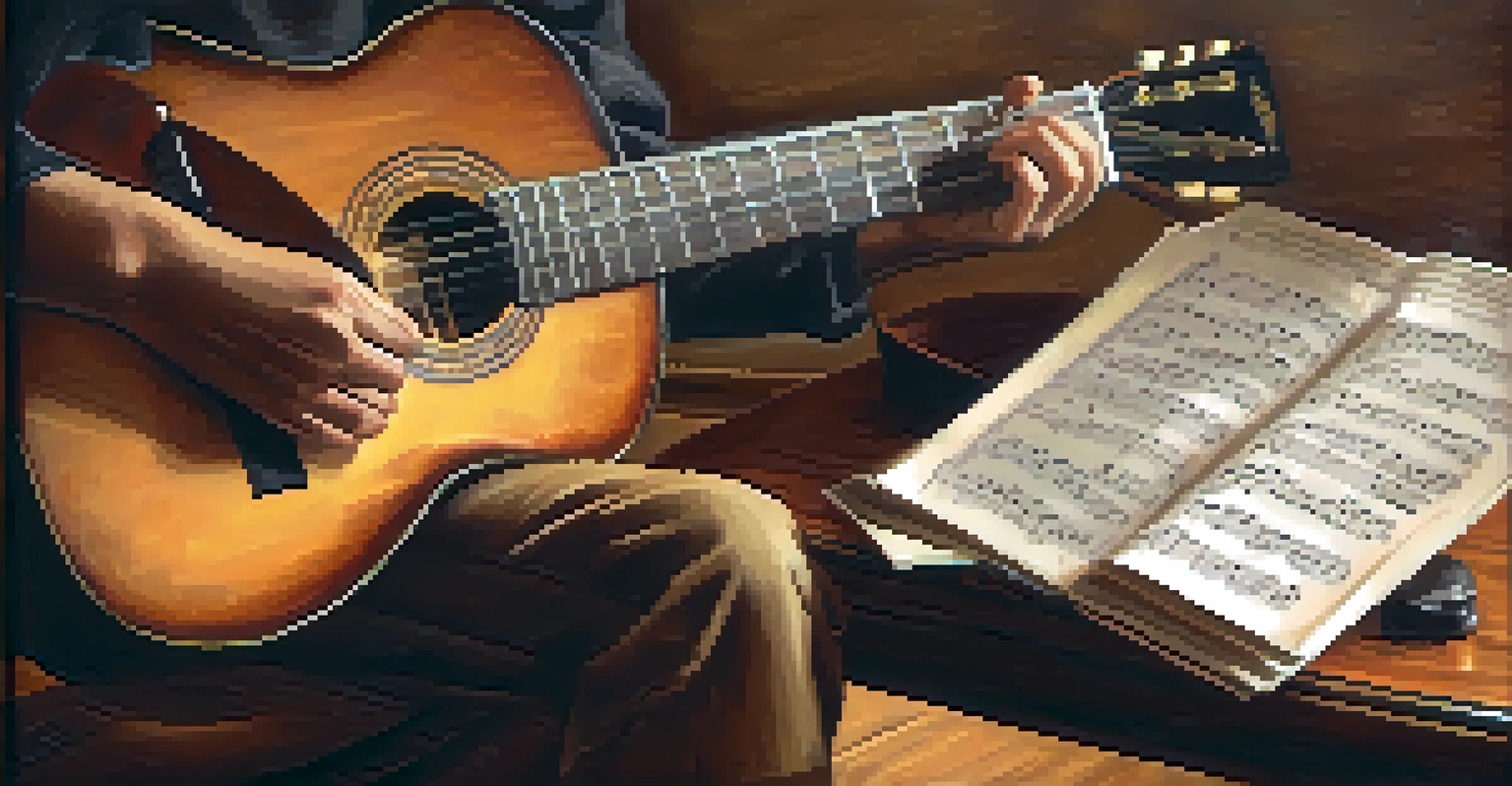The Benefits of Group Guitar Classes for Social Anxiety

Understanding Social Anxiety and Its Challenges
Social anxiety can feel like an invisible barrier, making even simple interactions daunting. For many, the thought of speaking or performing in front of others can trigger intense feelings of fear and self-doubt. This condition can hinder personal and professional growth, leaving individuals feeling isolated.
Music can change the world because it can change people.
The good news is that there are ways to combat these feelings, and one effective method is through group activities. By participating in shared experiences, like group guitar classes, individuals can gradually build confidence in a supportive environment. Here, the focus shifts from self-judgment to collective enjoyment.
Guitar classes allow participants to engage with others who may share similar struggles, fostering empathy and understanding. This communal setting can help dismantle the walls of anxiety, creating a space where everyone feels valued and accepted.
The Power of Music in Easing Anxiety
Music has a unique way of connecting people, transcending barriers and fostering a sense of belonging. When learning to play guitar, individuals can experience the joy of creating music, which can be incredibly therapeutic. The act of strumming chords or playing melodies can serve as a distraction from anxious thoughts.

Engaging with music also stimulates the release of dopamine, a chemical in our brains that promotes feelings of happiness and satisfaction. This natural boost can significantly improve one’s mood and outlook, making social interactions feel less overwhelming. It's like a musical hug that wraps around you, comforting and uplifting.
Social Anxiety Can Be Overcome
Group activities, like guitar classes, provide a supportive environment that helps individuals build confidence and reduce feelings of isolation.
Moreover, the shared experience of making music together can create lasting friendships. These connections can be the foundation for a supportive network, helping to alleviate feelings of isolation often associated with social anxiety.
Building Confidence Through Group Interaction
Group guitar classes provide a structured environment where participants can gradually step out of their comfort zones. Playing alongside others encourages individuals to take risks and share their musical journey, which can lead to increased self-confidence. When someone hears applause or encouragement from peers, it can ignite a spark of bravery.
The beautiful thing about learning is that no one can take it away from you.
As students progress and learn new skills, they often find themselves willing to take on more challenges, both musically and socially. This newfound bravery can spill over into other areas of life, making everyday social situations less intimidating. Think of it as a training ground for social skills, where each strum and chord is a step toward overcoming anxiety.
Furthermore, the camaraderie developed in group classes can help individuals feel more at ease when interacting with others. The shared goal of learning and improving together fosters a supportive atmosphere, making it easier to connect with fellow participants.
Creating a Safe Space for Expression
Group guitar classes often emphasize a non-judgmental approach, allowing participants to express themselves freely. This safe space encourages individuals to share their thoughts and feelings without fear of criticism, which is vital for those with social anxiety. Everyone is there to learn and grow together, creating an atmosphere of acceptance.
This sense of safety can be liberating, enabling participants to explore their musical talents while simultaneously addressing their social fears. It’s like a nurturing garden, where each person can blossom at their own pace without the pressure of competition. In turn, this freedom can lead to profound personal growth.
Music Fosters Connection and Growth
Engaging in music together not only enhances communication skills but also cultivates lasting friendships, making social interactions easier.
As students share their musical progress, they often find that vulnerability can strengthen connections with others. This exchange of experiences fosters mutual understanding, helping to dismantle the walls built by anxiety.
Enhancing Communication Skills Through Music
Learning to play guitar in a group setting naturally enhances communication skills. Participants learn to listen, respond, and collaborate, which are crucial components of effective interaction. Each session becomes an opportunity to practice these skills in a low-pressure environment, making it easier to transfer them to real-life situations.
Moreover, discussing music, sharing feedback, or even collaborating on a song encourages participants to articulate their thoughts clearly. This practice can significantly boost self-esteem and reduce anxiety when speaking in larger social contexts. The guitar serves as a bridge, connecting individuals through shared language and passion.
As students become more comfortable expressing themselves musically, they often find it easier to engage in conversations outside the classroom. The skills acquired through group interactions can lead to more meaningful connections in everyday life.
Fostering a Sense of Community and Belonging
One of the most profound benefits of group guitar classes is the sense of community they cultivate. Participants often forge bonds that extend beyond the classroom, creating friendships that provide emotional support. Having a community of like-minded individuals can be incredibly comforting for those grappling with social anxiety.
This sense of belonging can serve as a foundation for personal growth, encouraging individuals to step out and engage with the world. When one feels connected to others, the weight of anxiety can feel lighter, making social interactions more manageable. It’s akin to having a safety net that catches you when you feel unsure.
Celebrating Progress Boosts Confidence
Setting and achieving musical goals in a group setting encourages participants, reinforcing a sense of community and motivation for personal growth.
Additionally, being part of a community can motivate participants to set and achieve personal goals. The encouragement from peers can propel individuals to try new things and embrace opportunities they might have previously shied away from.
Setting Goals and Celebrating Progress Together
Group guitar classes often involve setting musical goals, which can be empowering for participants. Whether it’s mastering a new song or improving strumming techniques, these milestones provide a sense of direction. Celebrating these achievements, no matter how small, contributes to a positive atmosphere that reinforces motivation.
As individuals reach their goals, they can share their successes with the group, which fosters a culture of encouragement and celebration. This shared joy not only boosts self-esteem but also reinforces the idea that everyone is on a journey together. It’s like climbing a mountain as a team, where each step forward is met with cheers and support.

Moreover, recognizing progress helps individuals see their potential, both musically and socially. This newfound perspective can empower participants to tackle challenges outside of class, leading to a more fulfilling and engaged life.